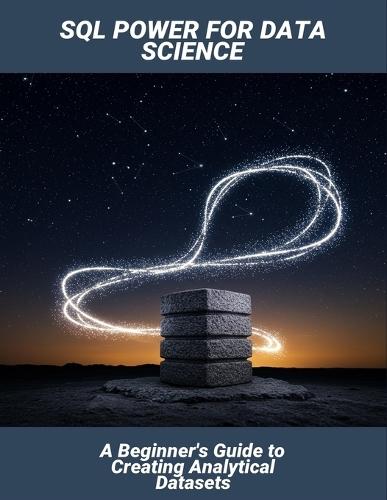Overview
In the rapidly evolving world of data science, the ability to effectively prepare data is paramount. Raw data rarely arrives analytics-ready, requiring meticulous cleaning, structuring, and aggregation. This crucial first step, data wrangling, is where SQL shines as an indispensable tool. ""SQL Power For Data Science: A Beginner's Guide To Creating Analytical Datasets"" is your definitive entry point into mastering the language that underpins almost every data-driven decision. Designed for aspiring data scientists, analysts, and anyone seeking to harness data's true potential, this book demystifies complex database interactions, transforming you from a novice into a confident data manipulator ready for real-world challenges. This comprehensive guide is meticulously structured to walk you through every essential aspect of SQL, tailored for a data science context. You will begin with foundational syntax, learning to query and retrieve data, mastering SELECT statements, and understanding data types. The book then progresses to advanced techniques crucial for data preparation, including filtering, sorting, aggregating with functions like COUNT, SUM, AVG, and GROUP BY, and joining multiple tables. Furthermore, you'll delve into powerful concepts like subqueries, common table expressions (CTEs), and window functions, vital for complex analytical tasks. Each concept comes with clear explanations, practical examples, and hands-on exercises, ensuring a solid grasp of applying SQL to real-world analytical problems, from data cleaning to feature engineering for machine learning. By following ""SQL Power For Data Science,"" you will gain a profound advantage in your data science career. This book doesn't just teach SQL; it teaches *analytical SQL*, empowering you to not only extract but also shape data into the precise format required for insightful analysis. You'll develop the ability to navigate large databases with ease, efficiently prepare datasets that would otherwise take hours of manual manipulation, and transform messy information into clean, coherent, actionable structures. The practical, step-by-step approach bridges the gap between theory and application, accelerating your learning curve and fostering a deeper understanding of data's architecture. This analytical proficiency will set you apart, enabling you to contribute meaningfully to any data project from its inception. Upon completing this guide, you will be able to: * Confidently write and optimize SQL queries for data extraction and manipulation. * Efficiently clean, transform, and aggregate raw data into analytics-ready datasets. * Prepare robust features for machine learning models directly within your database. * Understand and implement advanced SQL concepts like CTEs and window functions. * Collaborate more effectively with data engineers and other data professionals. * Unlock deeper insights from your data, leading to more informed business decisions. * Build a strong, foundational skill set indispensable for any modern data science role. Stop wrestling with chaotic data and start building the clean, organized, and powerful datasets you need to drive genuine insights. ""SQL Power For Data Science"" is your personal mentor, guiding you to become a proficient data preparation expert. Equip yourself with the most fundamental and enduring skill in the data science toolkit. Your journey to mastering analytical SQL and unlocking the full potential of your data begins here.
Full Product Details
Author: Jeffrey Tittle
Publisher: Independently Published
Imprint: Independently Published
Dimensions:
Width: 21.60cm
, Height: 0.30cm
, Length: 27.90cm
Weight: 0.159kg
ISBN: 9798273617810
Pages: 58
Publication Date: 08 November 2025
Audience:
General/trade
,
General
Format: Paperback
Publisher's Status: Active
Availability: Available To Order

We have confirmation that this item is in stock with the supplier. It will be ordered in for you and dispatched immediately.



